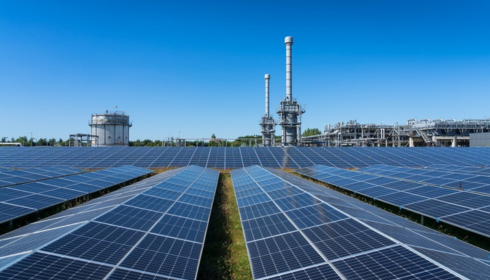Solar Industrial Solutions: Powering a Greener Tomorrow

In today’s world, sustainability is no longer an option but a necessity. With increasing industrial energy demands and rising environmental concerns, the adoption of solar industrial solutions has become a game-changer for businesses seeking to reduce operational costs and their carbon footprint. Solar power is not only a cleaner alternative to fossil fuels but also a smart long-term investment for industrial facilities.
What is Solar Industrial Power?
Solar industrial power refers to the use of solar energy systems in large-scale manufacturing, processing, or production units. These systems harness sunlight through photovoltaic (PV) panels or solar thermal collectors and convert it into electricity or heat. The generated energy is then used to power machinery, lighting, and other operational equipment within the facility.
Industries that consume high amounts of electricity—such as textile, chemical, automobile, cement, and food processing—can benefit immensely from solar energy. The scalability of solar installations allows businesses to customize energy solutions based on specific needs, making it an ideal fit across various sectors.
Benefits of Solar Energy for Industries
- Cost Savings: One of the most compelling reasons industries switch to solar power is the reduction in electricity bills. Once installed, solar panels produce free energy for 25-30 years. With rising grid electricity rates, this translates into substantial long-term savings.
- Energy Independence: By producing their own power, businesses reduce dependency on grid electricity and diesel generators. This ensures a steady supply of energy even during power outages, which is critical for uninterrupted production.
- Government Incentives: Many governments offer subsidies, tax breaks, and incentives for installing solar energy systems. These benefits significantly lower the initial investment and improve ROI.
- Environmental Benefits: Solar energy is clean, renewable, and reduces greenhouse gas emissions. Industries adopting solar power demonstrate environmental responsibility, which enhances their brand reputation and helps meet corporate sustainability goals.
- Low Maintenance: Once installed, solar panels require minimal maintenance. With routine cleaning and occasional inspections, they function efficiently for decades.
Types of Solar Installations for Industry
- Rooftop Solar Systems: Ideal for factories with large roof space. These panels can be installed without disturbing operations and efficiently utilize otherwise unused space.
- Ground-mounted Systems: Suitable for industrial units with adjacent land availability. These allow larger installations and easier access for maintenance.
- Solar Water Heating Systems: Widely used in food, dairy, and textile industries where hot water is essential. Solar thermal systems can significantly cut down on heating costs.
- Hybrid Systems: These combine solar power with grid or diesel energy sources. They provide flexibility and ensure a continuous energy supply, especially during cloudy days or high-demand periods.
Case Studies: Solar in Action
Several leading companies have adopted industrial solar solutions to transform their energy use. For instance, Coca-Cola’s manufacturing plants in India have integrated large-scale rooftop solar systems, leading to significant cost and energy savings. Similarly, Tata Motors installed one of the largest solar rooftop systems in the auto industry, showcasing how clean energy can fuel large operations.
How to Get Started
Businesses interested in switching to solar must begin with an energy audit to understand their current power consumption and future needs. Based on this data, a customized solar solution can be designed. Partnering with an experienced solar provider ensures quality installation, adherence to regulations, and smooth operation.
Key considerations include:
- Evaluating the type of installation (rooftop or ground-mounted)
- Understanding local government policies and incentives
- Choosing reliable solar technology and components
- Planning for periodic maintenance
Conclusion
The industrial sector has a vital role in the global transition to renewable energy. Investing in solar industrial systems not only brings financial advantages but also aligns businesses with the global goal of reducing environmental impact. By harnessing the power of the sun, industries can lead the way toward a sustainable and energy-efficient future.




